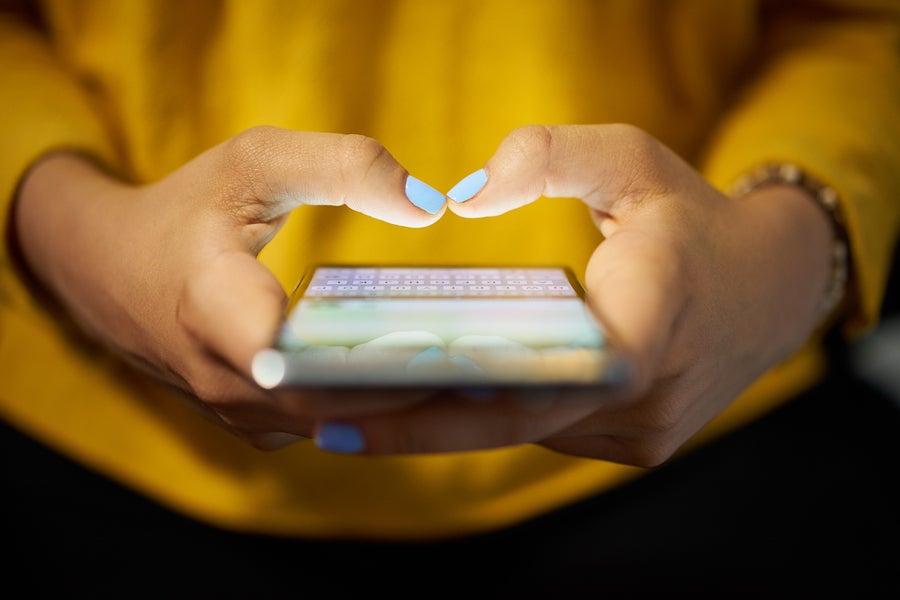Is Social Media Destroying Your Relationship?
Relationships
Despite all of these positives, psychologists and relationship experts warn that social media can have a negative influence on romantic relationships — especially when one partner spends too much time in the virtual world instead of the real one.
Just How Social Are We?
Social media has infiltrated just about every area of life, which is a pretty amazing feat when you consider that Facebook has only been around since 2004. YouTube posted its very first video in 2005 (which still has fewer views than “Gangnam Style”), Twitter joined the party in 2006, and relative newcomer Snapchat launched in 2011. Dating apps like Tinder (2012) and Happn (2014) weren’t far behind.
In a short amount of time, social networking sites like Facebook — which had nearly 2 billion users in early 2017 — have eclipsed traditional media like television. Research performed by eMarketer revealed that digital ad spending reached $72.09 billion in 2016, whereas TV ad spending came in at just $71.29 billion.
But it’s not just social networks that have changed the way people communicate — it’s the ability to access social apps on smartphones.
What Happened When Phones Got Smart
The smartphone has had such a revolutionary impact on our culture, the editors of Popular Mechanics ranked it above the TV and the telephone in the magazine’s list of “101 Gadgets That Changed the World.”
That’s awfully impressive for technology that’s only been around since 2007.
Once smartphones arrived on the scene, social networking use exploded. Data gathered by Pew Research shows that just 5% of adults used social media in 2005. By 2011, that number had skyrocketed to 50%. In 2017, nearly 70% of the population was getting social on the regular.
With the popularity of smartphones, it’s no surprise that mobile is the heavy hitter when it comes to how people prefer to access social sites. According to comScore’s 2016 Cross-Platform Future in Focus study, 80% of all social media time is done on mobile devices.
Like social networking sites, smartphones have pros and cons.
While it’s convenient to have 24/7 access to your email, it can also be incredibly inconvenient — like when you’re trying to enjoy a vacation day and the constant pinging of your phone keeps sucking you back into work.
In fact, widespread smartphone and social media use has led to a whole new nomenclature. Now, instead of a vacation day, stressed-out workers take a day off to “unplug” or do a “digital detox.” And when someone ignores you at dinner in favor of scrolling through texts on their phone, it’s called “phubbing” — a portmanteau of “phone” and “snubbing.”
In the workplace, constant connectivity can be a source of so-called “anticipatory stress,” which happens when employees feel like they’re never able to fully disconnect from work.
But what about your personal life? Can certain social media behaviors — or simply too much social media, period — wreak havoc in relationships? We asked relationship experts to weigh in on what types of social media habits have the potential to lead to breakups.
Warning Signs Social Media Is Hurting Your Relationship

Social scientists already know there’s a link between social media use and mental health disorders, such as depression, anxiety and low self-esteem.
Perhaps unsurprisingly, researchers have also found a connection between social media and breakups.
A 2010 survey conducted by the American Academy of Matrimonial Lawyers found that 81% of family law attorneys have seen an uptick in divorces caused by social media use. One in seven people polled by a UK law firm said they’d considered divorce due to a spouse’s social media use.
If you’re worried that social media might be coming between you and your significant other, here are four red flags to watch for.
1. Social Media Is an Addiction
No one likes to be a third wheel, whether their competition is the cute trainer at the gym or a smartphone.
If you or your partner argue about one (or both) of you spending too much time on your phone, you might be addicted to social media — something that can drive a wedge between even the most committed couple.
As Dr. Dale Archer puts it, “It used to be that a ménage à trois was three people engaging in consensual sex, but in this high tech world, that third person is being replaced by the smartphone.”
Smartphone addiction has become so widespread, it even has its own version of a celebrity mashup name: nomophobia (no-mobile-phone-phobia).
According to Dr. Axe, signs of nomophobia include:
- Feeling anxious or stressed out when your phone is almost out of battery power.
- Panicking when you can’t find your phone.
- Checking your smartphone right before going to bed, or checking it first thing before leaving your bed in the morning.
- Scrolling through your feed (or emails or texts) while eating or, ahem, doing other things. (And, yes, people admit to texting and emailing during sex.)
Smartphone and social media addiction can cause trouble in a relationship, but it can also be bad for your overall mental health. Jonathan Bennett, certified counselor and creator of The Popular Man website, says that social media addiction can cause people to develop an insatiable need for attention — and to feel bad when they don’t get it.
“It’s easy to get constant attention on social media and get addicted to the feeling,” he says. “Each time someone gets a like or comment on social media, the brain releases dopamine. So, with each notification, the person feels a quick high.”
As with other forms of addiction, however, the high doesn’t last for long. Eventually, Bennett points out, the person “needs more attention to continue to feel the rush. It’s like an addict who needs a fix, except the fix in this case is attention on social media.”
2. You Overshare Online

When you’re in love, you might feel like shouting it from the rooftops — or, if we’re talking about the twenty-first century version, updating your Facebook status every time your significant other does something romantic.
Although it’s normal to want to let the world know you care about someone, sharing too many details about your partner and your private life can make him or her uncomfortable.
Psychotherapist Stan Tatkin told Reader’s Digest that oversharing on social media can have a major negative impact on a relationship. He warns couples to be careful about “tweeting and Facebooking things that are private between the couple that nobody else should know…”
Before you hit “send,” ask yourself if you and your partner are 100% comfortable with the information or photo being online.
Is it something you want your grandmother seeing? Or your boss? Could it cause embarrassment or a sense of violation for your partner? If the answer to any of these questions is yes, it’s best to keep it between the two of you.
Also keep in mind that just because your social media accounts are private, the internet is forever — and the things you post online can be viewed by just about anyone.
At the end of the day, remember that privacy is a big part of intimacy.
3. Your Online Flirting Crosses the Line
Because “digital flirting” takes place online, over social networking sites or dating apps, some people don’t consider it cheating — while others think of it as a less serious offense than flirting that happens face to face.
However, as extreme cases like those involving former congressman Anthony Weiner show, sexting and sending sexually charged messages online can be devastating for a relationship, not to mention your professional life.
Furthermore, surveys show that a majority of men and an overwhelming majority of women count online flirting among cheating behaviors.
In a joint survey conducted by adult dating sites ChristianMingle.com and JDate.com, 82% of women and 56% of men considered texting and online flirting a form of unfaithfulness.
Because the internet offers anonymity, flirting with someone over social media may seem harmless. In some contexts, lighthearted flirting can even be an innocent way to boost your confidence. The problem is that what may be innocent flirting to one person means something entirely more serious to someone else.
What matters is how your partner perceives the interaction. So how do you know when you’ve crossed the line when it comes to digital flirting? Before you interact with someone over the internet, do a gut check by asking yourself: Would this bother my partner if he or she saw it? If it’s something you feel like you have to hide, it’s best not to send it at all.
4. You Play Internet Detective

According to psychotherapist, relationship expert and the author of “Disconnected,” Tom Kersting, the “internet sleuthing” aspect of social media can also breed distrust in a relationship.
“The temptation for many people in a relationship is to scour through their significant other’s social media content, which often creates a foundation in the relationship that is not built on trust.”
For example, if one partner perceives the other to be more popular online, they might be more inclined to interpret social media interactions as flirting. Something as seemingly harmless as an online friend liking a photo or retweeting a post could raise suspicions that lead to arguments and ultimately a breakdown in the relationship.
As Kersting states, “Social media can certainly break up relationships because oftentimes the photos and other content posted by your partner can be taken out of context.”
How to Salvage Your Relationship When Social Media Threatens
The good news is that social media use (and abuse) doesn’t have to spell doom for a relationship.
If you sense that you or your partner are letting social networking get in the way of your commitment to each other, it’s possible to get your relationship back on track. But it’ll take a digital detox, according to relationship experts.
“I would advise people to detox from social media, at least for a few days,” Bennett says. “Spend quality time with your partner and relearn how to be mindful and content with real world affection rather than the constant rush from social media attention.”
Kersting agrees. “Couples and individuals will need to disconnect from social media for a period of time until they get reacquainted with reality. There is no other way.”
If you’re truly addicted to your phone, setting it aside for a time may be harder than you expect. To make it work, you might need to take it in steps. Dr. Mark Griffiths at Addiction.com suggests starting with increments. “Start by proving to yourself that you can go 15 minutes without technology.” From there, you can bump up the time to longer periods.
Griffiths also encourages people to fill up their tech time with “digitally incompatible” activities like jogging, swimming or meditation.

If you’re giving up social media or your smartphone in an effort to save your relationship, try spending this time on an activity you can do with your partner, like taking a walk together or preparing a meal as a couple.
You can also turn off your phone and the lights and get busy in the bedroom — with a free sample of lube on us.
How are you reclaiming screen time for yourself and your partner?
Share your digital detox tips by tweeting us @ASTROGLIDE.
